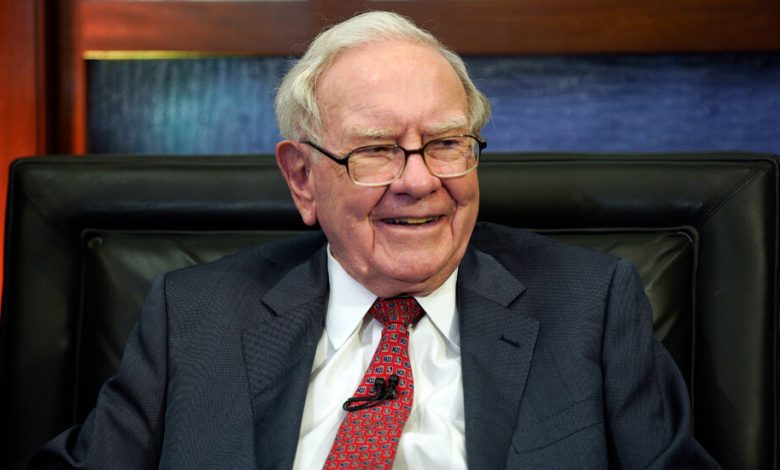Berkshire Hathaway Reports Major Investment Losses in 2022

Not even Warren E. Buffett, one of the world’s most successful investors, was immune last year to whipsawing markets.
But as his conglomerate, Berkshire Hathaway, reported a big loss, the billionaire executive urged shareholders to focus on the long term and the underlying health of his empire, which includes insurance, railroads, energy and stock holdings in the likes of Coca-Cola, American Express and more.
Berkshire reported on Saturday that it lost $22.8 billion last year, driven by $53.6 billion in unrealized losses on its investments. That mirrored the experience of other investors, who were hit by market volatility as inflation rose swiftly and central banks responded by rapidly raising interest rates.
But in his annual letter to shareholders, Mr. Buffett pointed to the company’s operating earnings, which are drawn from its underlying businesses and exclude those paper investment values. On that basis, Berkshire earned a record $30.8 billion last year.
And its holdings of cash and equivalents have grown to $125 billion, giving Mr. Buffett more firepower to invest in stocks and, potentially, buy new companies.
Our Coverage of the Investment World
The decline of the stock and bond markets this year has been painful, and it remains difficult to predict what is in store for the future.
- Value and Growth Stocks: Eight tech giants are no longer “pure growth” stocks, while Exxon and Chevron are, according to a new study. Here is what that means for investors.
- 2023 Predictions: There are plenty of forecasts coming for where the S&P 500 will be at the end of the year. Should you be paying attention to them?
- May I Speak to a Human?: Younger investors who are navigating market volatility and trying to save for retirement are finding that digital investment platforms lack the personal touch.
- Tips for Investors: When you invest and where matters for taxes. But a few rules of thumb can stave off some nasty surprises.
Factoring Berkshire’s investment performance into its overall returns is “100 percent misleading,” Mr. Buffett wrote, since those results are likely to change easily quarter to quarter.
Berkshire’s vast business empire is often seen as a microcosm of American industry. And many of its subsidiaries reported being hurt by the broader economic forces affecting the country.
Weaknesses included Berkshire’s consumer products businesses, which reported a 23 percent drop in earnings last year from 2021, hurt by lower demand and higher costs for raw materials and shipping. In its annual report, Berkshire said that it expected continued soft demand in 2023 and that it planned to “right size” its operations and reduce product inventories.
The conglomerate’s core insurance businesses, which generate the cash that powers Mr. Buffett’s vast investments, also reported underwriting losses from catastrophic events, like hurricanes, and a rise in auto claims at Geico.
And BNSF Railway reported a slight drop in earnings, in large part because of the rising cost of fuel and lower volumes of shipments.
Still, in his annual letter to shareholders — a must read for scores of investors, eager to glean his thoughts on the global state of affairs — Mr. Buffett professed continued faith in the resilience of the United States.
“We counton the American Tailwind and, though it has been becalmed from time to time, its propelling force has always returned,” he wrote. “I have yet to see a time when it made sense to make a long-term bet against America.”
Much of the letter was spent defending Berkshire’s practices.
That included share buybacks, on which the company spent $7.9 billion last year. The practice has drawn criticism from lawmakers, including Senator Elizabeth Warren, Democrat of Massachusetts, who argue that it diverts money to Wall Street investors instead of to employee pay raises or new investments.
“When you are told that allrepurchases are harmful to shareholders orto the country, or particularly beneficial to C.E.O.s, you are listening to either an economic illiterate or a silver-tongued demagogue (characters that are notmutually exclusive),” Mr. Buffett wrote.
He also defended Berkshire’s federal tax bill, amid ongoing criticism that he himself pays little in taxes relative to his overall wealth, which Forbes estimates at $106 billion. In his letter, Mr. Buffett said that Berkshire had paid $32 billion in federal taxes over the past decade, representing a tenth of 1 percent of all taxes that the government collected during that time.
“Had there been roughly 1,000 taxpayers in the U.S. matching Berkshire’s payments, no other businesses nor any of the country’s 131 million households would have needed to pay anytaxes to the federal government,” he wrote. “Not a dime.”
Mr. Buffett added a criticism of the federal government for spending significantly more than it collects in taxes, touching on a fight now bubbling in Washington over the debt ceiling. “Huge and entrenched fiscal deficits have consequences,” he wrote.
